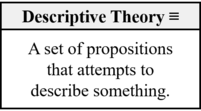Descriptive Theory (Sebastien-2016)
This is a definition of Descriptive Theory that states "A set of propositions that attempts to describe something."
This definition of Descriptive Theory was formulated by Zoe Sebastien in 2016.1 It is currently accepted by Scientonomy community as the best available definition of the term.
Contents
Scientonomic History
Acceptance Record
| Community | Accepted From | Acceptance Indicators | Still Accepted | Accepted Until | Rejection Indicators |
|---|---|---|---|---|---|
| Scientonomy | 15 February 2017 | The definition became accepted as a result of the acceptance of the respective suggested modification. | Yes |
Suggestions To Accept
Here are all the modifications where the acceptance of this definition has been suggested:
| Modification | Community | Date Suggested | Summary | Date Assessed | Verdict | Verdict Rationale |
|---|---|---|---|---|---|---|
| Sciento-2016-0002 | Scientonomy | 3 September 2016 | Accept a new taxonomy for theory, normative theory, descriptive theory to reintroduce normative propositions (such as those of ethics or methodology) to the scientific mosaic. | 23 January 2017 | Not Accepted | Since this modification consisted of two interrelated but essentially distinct suggestions - one definitional and one ontological - it was decided by the community to divide it into two modifications so that the gist of the proposed suggestions is properly articulated. In particular, it was agreed that there are two modifications in "the heart of this single modification - one ontological, the other definitional".c1 It was also agreed that the current formulation "is exclusively definitional, and does not give the community an opportunity to appreciate (and, well, accept) the ontological changes that come along with it".c2 Consequently, it was decided to divide this modification into two modifications - one definitional and one ontological.c3 |
| Sciento-2017-0001 | Scientonomy | 23 January 2017 | Accept new definitions for theory, normative theory, and descriptive theory. Also, modify the definition of methodology to reflect these changes. | 15 February 2017 | Accepted | The community agreed that this is "an important addition to theoretical scientonomy".c1 It was agreed that since "the paradox of normative propositions has been solved, a revised set of definitions was needed".c2 It was emphasized that if we're going to have any sort of conversation on the status of normative propositions in the mosaic, "then we need to start from a definition".c3 |
Question Answered
Descriptive Theory (Sebastien-2016) is an attempt to answer the following question: What is descriptive theory? How should it be defined?
See Descriptive Theory for more details.
Description
According to Sebastien's definition of the term, descriptive theories aim at describing a certain object under study, where describe is understood in the broad sense and includes explain, predict, etc. Thus, the term encompasses theories that attempt to describe a certain phenomenon, process, or state of affairs in the past, present, or future. All of the following propositions would qualify as descriptive:
- The acceleration of an object as produced by a net force is directly proportional to the magnitude of the net force, in the same direction as the net force, and inversely proportional to the mass of the object. (A general description of a phenomenon.)
- Paris is the capital of France. (A description of a current state of affairs.)
- Augustus was the first emperor of the Roman Empire. (A description of a past state of affairs.)
- Halley's comet will next appear in the night sky in the year 2062. (A description of a future event, i.e. a prediction.)
Typically, most propositions produced by both empirical and formal sciences would fall under the category of descriptive theory. Among others, this includes substantive propositions of physics, chemistry, biology, psychology, sociology, and economics, as well those of historical sciences. Excluded from this category are normative propositions, such as those of methodology, ethics, or aesthetics.
Reasons
No reasons are indicated for this definition.
If a reason supporting this definition is missing, please add it here.
Questions About This Definition
There are no higher-order questions concerning this definition.
If a question about this definition is missing, please add it here.
References
- ^ Sebastien, Zoe. (2016) The Status of Normative Propositions in the Theory of Scientific Change. Scientonomy 1, 1-9. Retrieved from https://www.scientojournal.com/index.php/scientonomy/article/view/26947.
